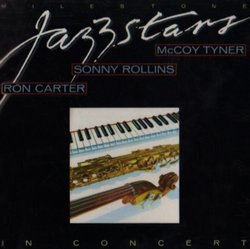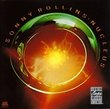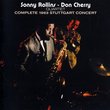| All Artists: Milestone Jazz Stars Title: In Concert Members Wishing: 0 Total Copies: 0 Label: Milestone Release Date: 10/15/1991 Album Type: Live Genres: Jazz, Special Interest, Pop, R&B Styles: Jazz Fusion, Modern Postbebop, Bebop, By Decade, 1970s, Funk Number of Discs: 1 SwapaCD Credits: 1 UPC: 025218550628 |
Search - Milestone Jazz Stars :: In Concert
 | Milestone Jazz Stars In Concert Genres: Jazz, Special Interest, Pop, R&B
|
Larger Image |
CD DetailsSimilar CDs
|
CD ReviewsAn Amazing Treat, The playing is Magnificent! Unity Gain | Somerville, MA USA | 01/25/2003 (5 out of 5 stars) "I've owned this album for at least 20 years. First on vinyl and then on CD. It ranks as one of my top 5. Even after all these years it is still an amazing treat to hear Sonny, McCoy, Ron and Al playing together. The music is often ferocious with The Cutting Edge as a tour de force. Everyone on this recording is playing above and beyond. Everytime I put this cd on I'm amazed. Get this CD!" Unexpected meeting N. Allen | 08/29/2004 (5 out of 5 stars) "You can't stop atrophy, not even in gifted musicians, but sometimes it can be blocked long enough to make room for the transcendent. When McCoy Tyner and Sonny Rollins were brought together by their label for a tour in 1978, it could have gone either way. Tyner's intellectualism could have battled Rollins' growing dependence on rhythm over harmonics. The least-challenging of both might have emerged. Instead, each adopted a share of the other's bias as if a strength. Out of the respect comes a masterpiece. Rollins opens deep explorations of harmonics that maintain his unmatchable blend of melody and rhythm. Sorry purists but he puts Coltrane to shame by playing all the notes while doing a lot rhythmically as well. Just listen to The Cutting Edge once, and then again. Who except Sonny Rollins can pull off a 5-minute unaccompanied horn solo like Continuum without repetition or running out of ideas? He shares with Beethoven and hardly anyone else the weird ability to keep a free-flowing stream of consciousness for very long periods without losing the melodic origin. The Grateful Dead would spend four hours a night trying to reach that, and get it for maybe five minutes. Sonny Rollins does it just about every time he moves front stage, doesn't he? Meanwhile, Tyner's usually highly internalized energy pushes out -- even as far as the audience sometimes! -- presumably influenced by Rollins' gift never to bore.
I don't know how to analyze the bass in ensemble work. Ron Carter brings in plenty of new ideas during his breaks. His ensemble playing is sometimes invisible, and my guess is that he's working selflessly to keep the two leaders' energy high and to let them go offtrack as far as they want. Is he bearing most of the underbelly burden because Milestone brought in a youngster, Al Foster, to drum? (Every new group needs the kid. Mingus at Massey Hall! Foster's terrific in the role.) In short I don't know an example of McCoy Tyner more energetic, nor Sonny Rollins more balanced. And yet this recording is barely in print. Bias 1: In 1978 I was living in New York and saw this lineup present the same program at the Beacon Theatre. It's too bad that these unusual matchups don't happen more often nowadays in jazz. I think it's telling that the program I saw was similar if not identical to the one that was recorded. These performers chose to take advantage of this matchup and applied a discipline that would make the most of their short time together. How often do label-created matchups in essence rehearse nightly for months before recording? Just imagine all the ideas they have heard and rejected or explored more deeply in all of the performances before making their way to posterity! Bias 2: Rollins is my chief touchstone to jazz and can do little wrong for me. Soon after the Milestone Jazzstars concert, for instance, I saw each of Tyner and Rollins without the other. Even sitting practically on top of his piano bench in a club, I was bugged by Tyner's musical arrogance. But with no pretension, Rollins as usual seemed continually to be showing me something about music and himself that I hadn't seen before. " |

 Track Listings (8) - Disc #1
Track Listings (8) - Disc #1


